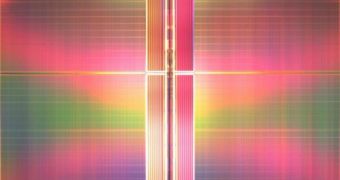Some time ago, Intel and Micron set up a joint venture known as IM Flash Technologies, meant to develop better NAND manufacturing processes, and it looks like the company is making the major step towards finally selling its latest and smallest chip to date.
What the joint venture announced was that it has now started sampling 3-bit-per-cell (3bpc) NAND Flash memory chips with a capacity of 64Gb, otherwise known as 8GB.
3bpc stores three bits of information per cell, more than both SLC (single-level cell, one bit) and MLC (multi-level cell, two bits).
What's more, the newcomer is about 20 percent smaller than the 25nm MLC chip of the same capacity, currently the smallest 8GB device in production.
Basically, this new chip is meant to be used in USB drives, SD memory cards and consumer electronics and, most importantly, is supposed to be the densest and smallest NAND made so far.
The main benefits that this new NAND device will bring are higher capacity, better energy efficiency and, of course, the high data transfer rates that Flash is known to be capable of.
"With January's introduction of the industry's smallest die size at 25nm, quickly followed by the move to 3-bit-per-cell on 25nm, we continue to gain momentum and offer customers a compelling set of leadership products," said Tom Rampone, Intel vice president and general manager of Intel NAND Solutions Group.
"Intel plans to use the design and manufacturing leadership of IMFT to deliver higher-density, cost-competitive products to our customers based on the new 8GB TLC 25nm NAND device," Rampone added.
"As the role of NAND memory continues to escalate in consumer electronics products, we see the early transition to TLC on 25nm as a competitive edge in our growing portfolio of NAND memory products," said Brian Shirley, vice president of Micron's NAND Solutions Group.
"We are already working to qualify the 8GB TLC NAND flash device within end-product designs, including higher-capacity products from Lexar Media and Micron," he finished.
IMFT should start mass-producting its latest device by the end of the year.

 14 DAY TRIAL //
14 DAY TRIAL //